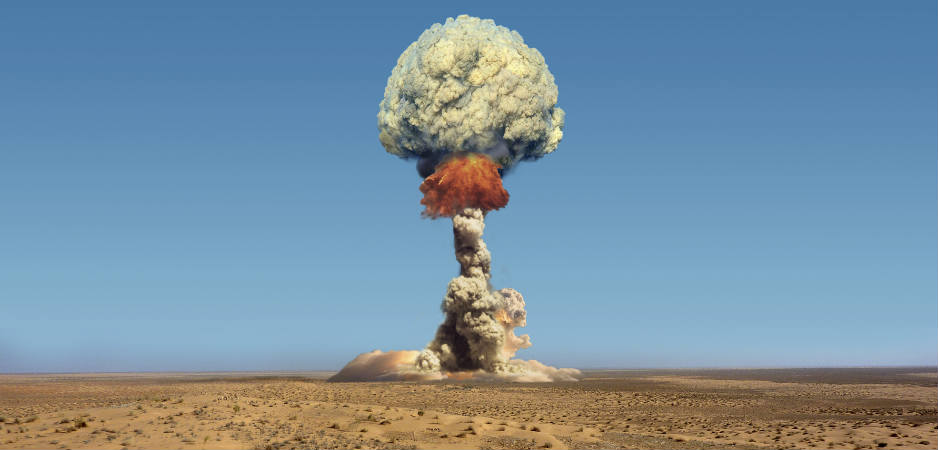Human beings can tackle climate change and save other species only if they realize that markets have limits and the purpose of life cannot be mere consumption.
Lost amidst headlines this week was an alarming bit of news. The Living Planet Report 2016 tells us that there has been an overall decline of 58% in vertebrate population sizes from 1970 to 2012. In other words, the populations of mammals, birds, reptiles, amphibians and fish have declined dramatically in the last 40 years. Of these, freshwater populations have experienced the steepest decline, falling by an alarming 81%. This downward trend of declining populations demonstrates no signs of slowing down and portends catastrophic consequences.
The Living Planet Report is published every two years and provides an assessment of the state of the world’s wildlife. The 2016 report measured trends in 14,152 monitored populations of 3,706 vertebrate species. Critics claim its data is flawed, but the report is still an impressive and exhaustive piece of work.
In the United States and India, the report was largely ignored. In France, Germany, Britain and much of Europe, the media did a decent job focusing on the issue. To some people’s surprise, China’s state-controlled media paid a fair bit of attention to the report. This discourse on the dramatic fall in world wildlife populations tells us about the divergent levels of environmental consciousness in different societies.
Fractious large democracies like the US and India are far too caught up in relentless scandal, constant campaigns and myopic issues to care too much about the environment. In contrast, the smaller and more equitable democracies of Europe worry about the health of the planet. So do Chinese leaders who seem to be alarmed by the toxic levels of pollution caused by their three decades-long mad dash for growth.
The report is important because it is a wakeup call for humanity to change its ways. The human population has exploded this century and so has its consumption. Humanity is now demanding more than the planet can offer. The loss and degradation of habitat is the biggest reason for the decline in wildlife populations. Overexploitation is the second reason. The World Wildlife Fund (WWF) reports that “unsustainable fishing practices are pushing many fish stocks to the point of collapse.” Hunting of animals as in the case of lions is wreaking havoc to their numbers. Poaching is a key reason for the dramatic fall in numbers of animals like elephants and rhinoceroses.
Pollution, invasive species and climate change are three other reasons for the fall in wildlife populations. In brief, all reasons for the decimation of wildlife are human generated. As the report remarks, “humanity is demanding more than our planet can sustainably offer.” It goes on to say that “we now need the equivalent of 1.6 earths to provide the natural resources and services we require at our current rate of consumption.”
The spectacular success of the human species has proved to be a curse for others. Human numbers have skyrocketed over the millennia. Yale Scientific points out that the human population rose from 200 million in 1 AD to a billion in 1804. Since then, the number has taken off. By 1900, the human population had risen to 1.6 billion, and this number crossed 2.5 billion by 1950. Today, this population is approximately 7.5 billion.
Even more remarkable than the rise in human numbers has been the increase in human consumptions. From hunter gatherers living off the land, human beings have turned into compulsive shoppers at giant supermarkets. Human greed has proven to be insatiable and other species have paid the price.
Not only are wildlife numbers plummeting, but the planet is in “the midst of its sixth mass extinction of plants and animals.” Not since the dinosaurs died off 65 million years ago has the world seen such rates of extinction. Dozens of species are going extinct every day, and nearly 30-50% of all species are possibly heading toward extinction by 2050.
Past mass extinctions were caused by natural phenomena such as asteroid strikes, volcanic eruptions and natural climatic shifts. The current one is being caused by us—the lovely human beings. This author was recently in Kenya where the impact of rising population and increasing consumption is evident in its stark naked ugliness. In Nairobi, plastic litters the land, people burn rubbish everywhere and traffic jams fill the air with noxious fumes. Eldoret, a town in the fabled Rift Valley, faces similar issues and is not what it once was.
Bit by bit, human beings are decimating other species everywhere. Even the Amazon, one of the last remaining pieces of wilderness, is disappearing fast with 20% of the forest chopped down over the last 40 years. Other parts of the world are not doing much better. In 2015, forest fires in Indonesia reached an apogee. For a few months, the tiny country released more emissions per day than the US. Trees, animals and other species suffered incalculable damage as forests and the great domes of peat on which they sit grew caught fire. All this occurred to meet human demand for paper and palm oil. Of course, this environmental disaster was barely covered in the wonderfully sanctimonious land of Uncle Sam.
Such is the impact of the human species that the Holocene geological epoch has turned into the Anthropocene. Climate change has become real and tangible. Global warming is causing an unusually rapid increase in the earth’s temperatures. NASA estimates that “the rate of temperature increase has nearly doubled in the last 50 years” and that “temperatures are certain to go up further.”
 Fair Observer provides you deep and diverse insights for free. Remember that we still have to pay for servers, website maintenance and much more. So, donate now to keep us free, fair and independent.
Fair Observer provides you deep and diverse insights for free. Remember that we still have to pay for servers, website maintenance and much more. So, donate now to keep us free, fair and independent.
The cause for rising temperatures is well documented. Since the beginning of the Industrial Revolution, carbon dioxide levels have increased by nearly 38% as of 2009 and methane levels have gone up by 148%. According to NASA, “the first six months of 2016 have been the warmest half-year on record.” NASA went on to observe that “five of the first six months of 2016 also set records for the smallest respective monthly Arctic sea ice extent since consistent satellite records began in 1979.”
So, what are the implications of rising temperatures, melting polar ice caps and climate change in general?
The educational website for children of the Environmental Protection Authority (EPA) rather mildly states that “the negative effects [of climate change] are expected to outweigh the positive ones.” The EPA remarks that “some effects, like longer growing seasons for crops, might even be good!”
The EPA website is being more than disingenuous. It probably explains why the US neither cares nor does much to curb climate change. Most scientists estimate the potential consequences of climate change to be catastrophic. Rising sea levels are likely to submerge large swathes of territory, including the poor and populous country of Bangladesh that is facing disaster. A rather well researched story in The New York Times aptly described Bangladeshis as living on “borrowed time on disappearing land.”
Hurricanes, typhoons, storms, heatwaves, drought, heavy downpours, floods and other extreme weather conditions have become more frequent and increased in severity. Spring and summer rains in parts of Ethiopia have declined by 15-20 %, negatively affecting crop yields and pasture conditions. Combine this with a rising population and the picture turns quite grim pretty quickly. Many other parts of the world are experiencing similar challenges. The specter of a dire water crisis, increasing conflict, rising radicalization and growing numbers of refugees portends cataclysmic disaster. This is not even factoring in the potentially dire consequences of the loss of biodiversity, the possibility of the emergence of new diseases, and the disruption in the cycle of life that has evolved over millions of years.
After years of denial, indifference and inaction, leaders of international institutions, national governments and nongovernmental organizations have been trying to contain climate change in their own way. The Rio Convention of 1992 was followed by the Kyoto Protocol of 1997. Last year, the 2015 Paris Climate Conference, or COP 21, led to what the BBC called a landmark deal. Delegates from nearly 200 countries arrived at a deal in Kigali, Rwanda, to end the use of hydrofluorocarbons. In about a week, the 22nd session of the Conference of the Parties (COP 22) will commence in Marrakech, Morocco. So far, these conferences have been unable to achieve anything significant and have limited themselves to spouting pious homilies.
Yet many see the zeitgeist changing. US President Barack Obama has been pushing his rather reluctant country to be less wasteful. Even Pope Francis, who represents an institution that has long opposed contraception and contributed to the current population explosion, has issued an encyclical lamenting the harm human beings have inflicted upon the earth by their irresponsible use and abuse of its resources. Even superficial and wasteful Hollywood is starting to pay attention. Leonardo DiCaprio has produced and anchored a documentary on climate change that is attracting attention.
Does that mean humanity will pull back from the brink as in a jolly good Hollywood blockbuster? The truth is that human beings are exceedingly clever apes but not necessarily wise ones. The species that is capable of conceiving the zero, composing Für Elise and creating space stations is also responsible for imposing the Inquisition, conducting multiple genocides and poisoning the earth for gold.
Most celebrity leaders from Obama to DiCaprio are dancing around the 800-pound gorilla in the room. The wonderful global economic system with its interconnected trading screens of New York, London and Hong Kong has gone stark raving mad. In a 2015 talk, this author pointed out that economics is not a science. In the last century and more, it has been treated as one even by dissidents like Karl Marx. The reality is that economists are just like priests, presiding over a theology on arbitrary assumptions. One of these is that homo economicus is supposed to make a mad dash for wealth. According to economists, the purpose of life is maximizing utility, a wonderfully seductive idea first proposed by Jeremy Bentham. Given such a purpose, a competitive global marketplace is the best way to maximize demand and supply of goods and services.
In this system, investors want ever higher returns. They invest their capital in the most profitable companies. Managers run these companies to maximize profits. Investors use quarterly results to judge managers and ensure they are constantly performing. Managers work incessantly to increase profits by earning higher revenues and cutting costs. To sell stuff, they might have to advertise a touch disingenuously to their buyers, but that is “mere puff” and quite alright. Managers might also have to dump chemicals into a river or fire workers to cut costs, but that is par for the course.
In the US, for all of DiCaprio’s Hollywoodish meeting with the pope, there is a fanatical belief that there are no limits to markets. Even churches compete in the market for souls. Evangelical talk show hosts sell salvation with a panache that would make Johann Tetzel, the infamous salesman of Indulgences who infuriated Martin Luther, a shrinking violet in comparison. They do not want children to learn about evolution and damn climate change as a conspiracy of elitist godless sinners.
Of all the high priests of the market, none has been more influential than Milton Friedman. Adviser to Ronald Reagan and Augusto Pinochet, he proposed the privatization of collectively-owned assets such as the post office and national parks. Friedman forgot what Adam Smith had not: “moral sentiments” underpin markets. If sellers cheated buyers and buyers did not pay sellers, then the market would collapse. Markets themselves need common measurement systems, property records, rule of law and much more.
Human beings are complicated creatures and societies are infernally complex. Friedman’s simplistic theology that provided a rallying point to Cold War warriors is past its sell by date. Today, climate change matters. Other species matter. Since the collapse of communism, human beings have been running away from the great moral questions of our time. They cannot continue to do so.
Every American woman who wants a diamond ring must ponder whether the blood and sweat spilled in Africa for that piece of fine carbon is worth it. Similarly, every Chinese man who wants tiger bones to improve his virility has to realize this involves the torturous death of a majestic member of an endangered species.
The energy we consume, the food we eat, the furniture we use and every act of modern living has an impact on the environment that is significant if not directly obvious. The consumerist society epitomized by DiCaprio’s Hollywood has to give way to a more thoughtful one that rediscovers joy in experience and relations instead of mere transactions. To curb climate change and save other species, we have to turn away from consumerism. To use jargon from economics, the demand side of the equation must decline in value.
At the same time, supply has a big role to play. Elon Musk is part-right in focusing on batteries. If African villages got their energy from the sun and could save it in batteries, they would not need power plants. The market will not be able to supply all technologies alone. The uncertainties are too high and the time horizons too long. Investors will throw entrepreneurs and managers under the bus for failing to meet quarterly targets. In any case, returns are scarce in a world awash with capital and the global economy in trouble.
At the same time, the world is facing long-term challenges. We need to plant more trees almost everywhere, dig ditches to harvest rainwater in arid areas, and fight poachers to protect species that are on the edge of extinction. These actions require big long-term bets that markets with their quarterly fixation and politicians with their eye on the next election are unwilling and unable to make. Perhaps it is time for a secular temple, mosque or church infused with the idea of a new citizenship. Humanity needs a new humanism where markets are not all and life is more than stuff.
*[You can receive “The World This Week” directly in your inbox by subscribing to our mailing list. Simply visit Fair Observer and enter your email address in the space provided. Meanwhile, please find below five of our finest articles for the week.]
Clinton Will Win, Trump Will Protest
With the US presidential election fast approaching, the next chapter of American politics will be an interesting one.
The fact-checking is finished, and the polls to determine who won and who lost will soon be wiped from our collective memory. While it lasted, it wasn’t exactly waterboarding but for many it was an unambiguous case of torture. The three debates are over, praise the Lord. America is now entering the brief phase in which it can look back at the weirdest US presidential campaign in history, and look forward to the denouement when the votes are finally counted during the night of November 8.
Most commentators of the debates have tried to analyze not only what came out of the candidates’ mouths, but also the sniffles that emerged from Donald Trump’s nose. Some noticed that throughout the debates Hillary Clinton made very effective use of her teeth, visible through a studied but authentically charming smile, whose brightness was… Read more
Workplace Change: A Shifting Paradigm in MENA
Women in the Middle East and North Africa have been active in one of the most profound contexts of change.
Much has been written and speculated about life in the Middle East and North Africa. Some have experienced the love of being in a culture steeped in history and ancient folklore, romantic tales and strong cultural traditions. Others either love or loathe the contrast of modern cities like Dubai or Doha. These people simply prefer to submerge themselves in the hustle and bustle of everyday life, and join in the globalized “rat race” just like you would in any other major world city.
So, what makes the Middle East so enigmatic? What makes some people come for a holiday of a lifetime to satisfy their geographical curiosity and then never want to leave?
In a word: change. Over the past two decades, the Middle East has witnessed unprecedented levels of change. Not a single person—young or old… Read more
This is How the Anti-Trump Was Destroyed
It is a mistake to ignore the US primary elections, where Bernie Sanders was crushed by so-called democratic institutions.
For all the hand-wringing over the US presidential candidates, for all the from whence rose the “Trump Monster,” for all the reminiscing for the Democratic primary’s more-substance filled days, insight is here. Yet it comes by examining the campaign of Vermont Senator Bernie Sanders—aka the anti-Trump—in which he advocated for love and compassion to be etched into American policies. The American public did want to see his etchings, and they made him competitive throughout the presidential primaries.
Ultimately, Sanders was crushed by the establishment, a term mocked by Hillary Clinton’s supporters during the primary, who were known to be deeply committed to her advocacy. Thomas Frank’s new contribution in Harper’s Magazine and a review of this author’s previous articles provide a useful look into an important chapter of American progressive history, upon which the US must understand… Read more
Why US-China Cooperation is Important in Dealing With North Korea
US-China cooperation and a coherent strategy are necessary to roll back the nuclear ambitions of North Korea.
In response to North Korea’s fifth nuclear test in September, Chinese and American diplomats are negotiating sanctions to limit the nation’s energy trade, according to sources at the United Nations Security Council. This new effort to tighten sanctions will reportedly target Pyongyang’s ability to trade coal, iron ore and crude oil.
As North Korea’s only friendly neighbor and primary trading partner, China’s cooperation is key to establishing effective sanctions. Beijing is faced with a delicate balancing act, working to prevent a total collapse in North Korea, for humanitarian reasons, and also to avoid a potential Korean unification under American guidance.
However, continued North Korean belligerence has been taking a toll on its tenuous friendship with China. The nation’s stubborn refusal to halt advancement of its nuclear program has proved frustrating to China, leading China to reconsider its willingness to discuss sanctions… Read more
The End of Nuclear Diplomacy Between Russia and US
A world without nuclear weapons seems as far removed now as during the 1980s.
In 2000, Bill Clinton and Vladimir Putin signed a deal calling on both countries to reduce their stockpiles of weapons-grade plutonium. The deal, called the Plutonium Management and Disposition Agreement (PMDA), was the hallmark of an era when both countries were committed to healing the deep wounds left by the Cold War.
Earlier this month, following two years of conflict and disagreements that shook US-Russia relations, Putin suspended the 16-year-old deal with America. In a statement on October 3, President Putin said the decision stemmed from “the emergence of a threat to strategic stability and as a result of unfriendly actions by the United States of America towards the Russian Federation”—a reference to the uproar caused by Russia’s continued bombing of civilians in Aleppo.
Ostensibly, the reason the PMDA was scuttled is because President Barack Obama recently proposed changing the method that was… Read more
The views expressed in this article are the author’s own and do not necessarily reflect Fair Observer’s editorial policy.
Photo Credit: Geranija
Support Fair Observer
We rely on your support for our independence, diversity and quality.
For more than 10 years, Fair Observer has been free, fair and independent. No billionaire owns us, no advertisers control us. We are a reader-supported nonprofit. Unlike many other publications, we keep our content free for readers regardless of where they live or whether they can afford to pay. We have no paywalls and no ads.
In the post-truth era of fake news, echo chambers and filter bubbles, we publish a plurality of perspectives from around the world. Anyone can publish with us, but everyone goes through a rigorous editorial process. So, you get fact-checked, well-reasoned content instead of noise.
We publish 2,500+ voices from 90+ countries. We also conduct education and training programs
on subjects ranging from digital media and journalism to writing and critical thinking. This
doesn’t come cheap. Servers, editors, trainers and web developers cost
money.
Please consider supporting us on a regular basis as a recurring donor or a
sustaining member.
Will you support FO’s journalism?
We rely on your support for our independence, diversity and quality.











